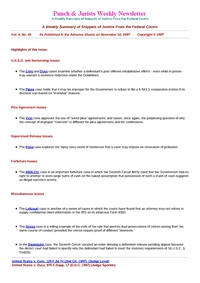Case approved use of "wired" plea agreements and refused to allow withdrawal of plea agreement where defendant alleged it had been coerced by promise of leniency to his brother.
One of the most mystifying (and illogical) anomalies of criminal law is how the same word can have such …
Important forfeiture case that holds that mere possession of large sums of cash does not establish a valid narcotics nexus.
In this case the Second Circuit upheld the imposition of a $25,000 fine against Attorney Gerald Lefcourt, President of the NACDL, for his failure to disclose client-identifying information on the IRS's infamous Form 8300. Pursuant to the provisions of 26 U.S.C. § 6050I, any person "engaged in a trade …
Judge Brewster's dissent argues that there was impermissible double counting through the use of both the vulnerable victim and abuse of trust adjustments.
United States v. Core, 125 F.3d 74 (2nd Cir. 1997)
United States v. Dyce, 975 F.Supp. 17 (D.D.C. 1997)
Both of these cases shed new light on the issue of whether post-conviction rehabilitation can constitute a valid ground for a sentencing departure.
In the Core case, the defendant spent …
Case examines in depth requirements for mail fraud convictions and schemes to deprive another of the intangible right of honest services.
Case examines in detail some of the highly technical aspects of the grouping rules.
United States v. Core, 125 F.3d 74 (2nd Cir. 1997) (Judge Leval)
United States v. Dyce, 975 F.Supp. 17 (D.D.C. 1997) (Judge Sporkin)
Both of these cases shed new light on the issue of whether post-conviction rehabilitation can constitute a valid ground for a sentencing departure.
In the Core …
This case notes that Federal Rule of Appellate Procedure 9(a), which is made applicable to post-conviction detention orders by Fed.R.App.P. 9(b), provides that the district court must state in writing, or orally on the record, the reasons for an order regarding release or detention in a criminal case"; and …
As the army of armed probation officers continues to grow day by day, revocation of probation cases already consume a significant percentage of the courts' dockets; and they are destined soon to become one of the single biggest areas of criminal defense litigation. However, despite the growth of such …
They never give up - especially when a prosecutor wants to fatten up his resume with an easy conviction of a notorious defendant. In this case, defendant Gregory Scarpa, Jr. was already serving a 20-year sentence for a substantive RICO conviction that was obtained in 1989. Nearly eight years …
It has long been accepted that motions for downward departures under U.S.S.G. § 5K1.1 have become the modern day version of Judas's Kiss: they grant the Government almost unfettered discretion to pull the rug from under those snitches who have agreed to cooperate. One reason why that power is …
The Court held that the CSRA is a "facially valid exercise of congressional power under the Commerce Clause. The Court also held that "the Tenth Amendment and Article I of the Constitution are complements to each other. . . That is, if Congress acts pursuant to an enumerated power, …
As the army of armed probation officers continues to grow day by day, revocation of probation cases already consume a significant percentage of the courts' dockets; and they are destined soon to become one of the single biggest areas of criminal defense litigation. However, despite the growth of such …
Case examined 1993 amendment to Guidelines which provided a new definition of "cocaine base"; and held that only the form of cocaine base which is "crack" is eligible for the enhanced sentence.
Before November 1, 1993, the Sentencing Guidelines did not define the term "cocaine base." However, sec. …
In affirming the use of the "gun bump enhancement" specified in § 2D1.1(b)(1), the Court held that it is not necessary for the Government to show that the gun was present during a specific drug trafficking offense (Id., at 596).
In this case one gun was found in …
Before November 1, 1993, the Sentencing Guidelines did not define the term "cocaine base." However, sec. 2D1.1 then was amended to provide:
"Cocaine base," for the purposes of this guideline, means "crack." "Crack" is the street name for a form of cocaine base, usually prepared by processing cocaine hydrochloride …
In this case the defendant was charged with making six threatening calls by telephone. He moved to dismiss the indictment as facially defective because it did not allege an essential element of the crime - namely that "he subjectively intended the communication to be perceived as a threat." The …
Case affirmed civil penalty on lawyer for failing to file proper IRS Form 8300 identifying name of client who paid cash for legal services.
